In today’s second reading, Paul is clear that we should not be overconfident in ourselves. He writes, whoever thinks he is standing secure should take care not to fall. He cautions against presumptuousness by comparing the Corinthians to the Israelites during the Exodus who, despite their newfound freedom, grumbled against God as soon as things got tough. He wants them to understand that the things that happened to their ancestors await them if they, too, desire evil things.
This warning, however, will be counterbalanced in the very next verse by Paul’s reassurance of God’s character. We didn’t hear his words in the reading today, but they are important to note because they are not exclusive to this letter, and in fact are at the heart of the Good News. In summary, Paul says: “God is faithful and when we falter, he is there to guide us and give us strength”(1 Cor. 10:13). The virtue of hope that is cultivated in response to this is the perfect counter to the presumption against which he is preaching.
We see this pattern of warning and reassurance repeated throughout the New Testament and Gospels. In today’s passage Jesus urges the crowd to repent, and not just once but twice. More specifically, he warns against hypocrisy, against seeing oneself as less sinful than anyone else, or another group of people – in this case, the Galileans murdered by Pilate or the eighteen who died under the tower of Siloam. Jesus’ words are not ambivalent: if you do not repent, you will all perish as they did!
Yet this warning is immediately followed by Jesus’ parable of the unproductive fig tree. In this story, the gardener lobbies on behalf of the tree, arguing that if he cultivates and fertilizes the ground surrounding the tree, the tree might bear fruit. In short, be patient.
So the Lord is with us, God’s beloved creation.
We must always remember that God created us good! And no matter how far we may stray from this goodness, the potential for goodness within each of us remains. God, the master gardener, placed it within each of us at the moment of our unique creation. No sin, no amount of bad fruit or barrenness, can render that goodness obsolete. The gardener always lobbies on our behalf.
Amidst barrenness, we need to better cultivate the ground we rest in, so to speak – our culture, our habits, the things that influence us. Pruning our ground of weeds and fertilizing it with nutrients allows the good that is within us to take root and grow.
At the end of the day, our confidence rests not in ourselves but in our God who is faithful. This God has indeed come down to rescue [us], as foretold to Moses through the burning bush. We return to the Eucharistic table each week, perhaps daily, to be reminded of this truth. For on this table God shows up and stands strong, no matter how weak or unstable we ourselves may feel. We cling to Christ, confident in God’s faithfulness to his good creation.
(Fr. Michał Pająk, OMI, March 23, 2025)

